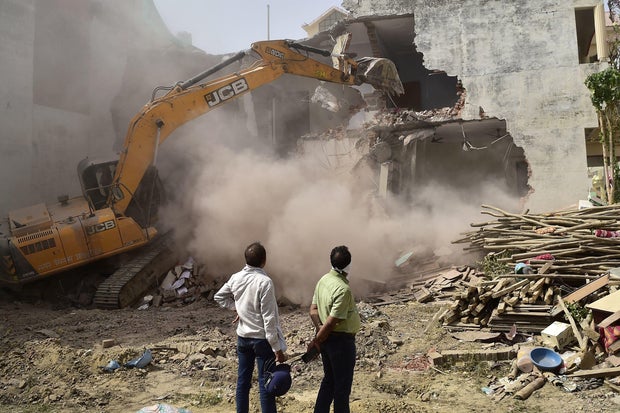New Delhi — India’s Supreme Court ruled Wednesday that authorities demolishing illegally-constructed homes and other properties belonging to suspected criminals is unconstitutional and must cease. The practice is allegedly used widely by several state governments to punish suspects outside the court justice process, and is commonly known as “bulldozer justice.”
“The executive can’t become a judge and decide that a person accused is guilty and, therefore, punish him by demolishing his properties. Such an act would be transgressing [the] executive’s limits,” the court said in a 95-page judgement.
The court issued its ruling in response to several petitions over a spate of home demolitions targeting suspected criminals in states governed by Prime Minister Narendra Modi‘s Bharatiya Janata Party (BJP) in recent years. Critics have accused the BJP state administrations of using bulldozer justice primarily to target Muslims — an accusation the party has repeatedly denied.
BJP state officials have argued that due process of law has been followed in carrying out the demolitions, but the court said authorities had adopted a “pick and choose” attitude toward illegally constructed homes, singling out those belonging to Muslims suspected of other crimes while sparing similar, but non-Muslim-owned illegal dwellings in the same area.
SANJAY KANOJIA/AFP/Getty
“In such cases, where the authorities indulge in arbitrary pick and choose of structures and it is established that soon before the initiation of such an action an occupant of the structure was found to be involved in a criminal case, a presumption could be drawn that the real motive for such demolition proceedings was not the illegal structure, but an action of penalizing the accused without even trying him before the court of law,” the court said.
One of the petitions to the Supreme Court was filed over the April 2022 demolition of dozens of homes belonging largely to Muslims following sectarian clashes in Delhi’s Jahangirpuri neighborhood, which drew allegations of religious discrimination and extrajudicial punishment.
“The chilling sight of a bulldozer demolishing a building… reminds one of a lawless state of affairs,” Justices B.R. Gavai and K.V. Viswanathan said in the court’s Wednesday judgment. “Our constitutional ethos and values would not permit any such abuse of power and such misadventures cannot be tolerated by the court of law.”
The court warned state authorities it would take action against officials found guilty of “such highhanded and arbitrary” actions and issued detailed guidelines for the demolition of homes constructed without the required permits.
The new guidelines make it mandatory for authorities to give at least 15 days’ advance notice to an occupant before an illegal home is demolished and to explain the reason for the building being razed.
The new guidelines state that occupiers of such properties must be given sufficient time to either remove the construction or challenge the demolition order in a court.
Authorities in five of India’s 28 states bulldozed 128 structures over the course of just three months in 2022, human rights group Amnesty International said in a report in February.

